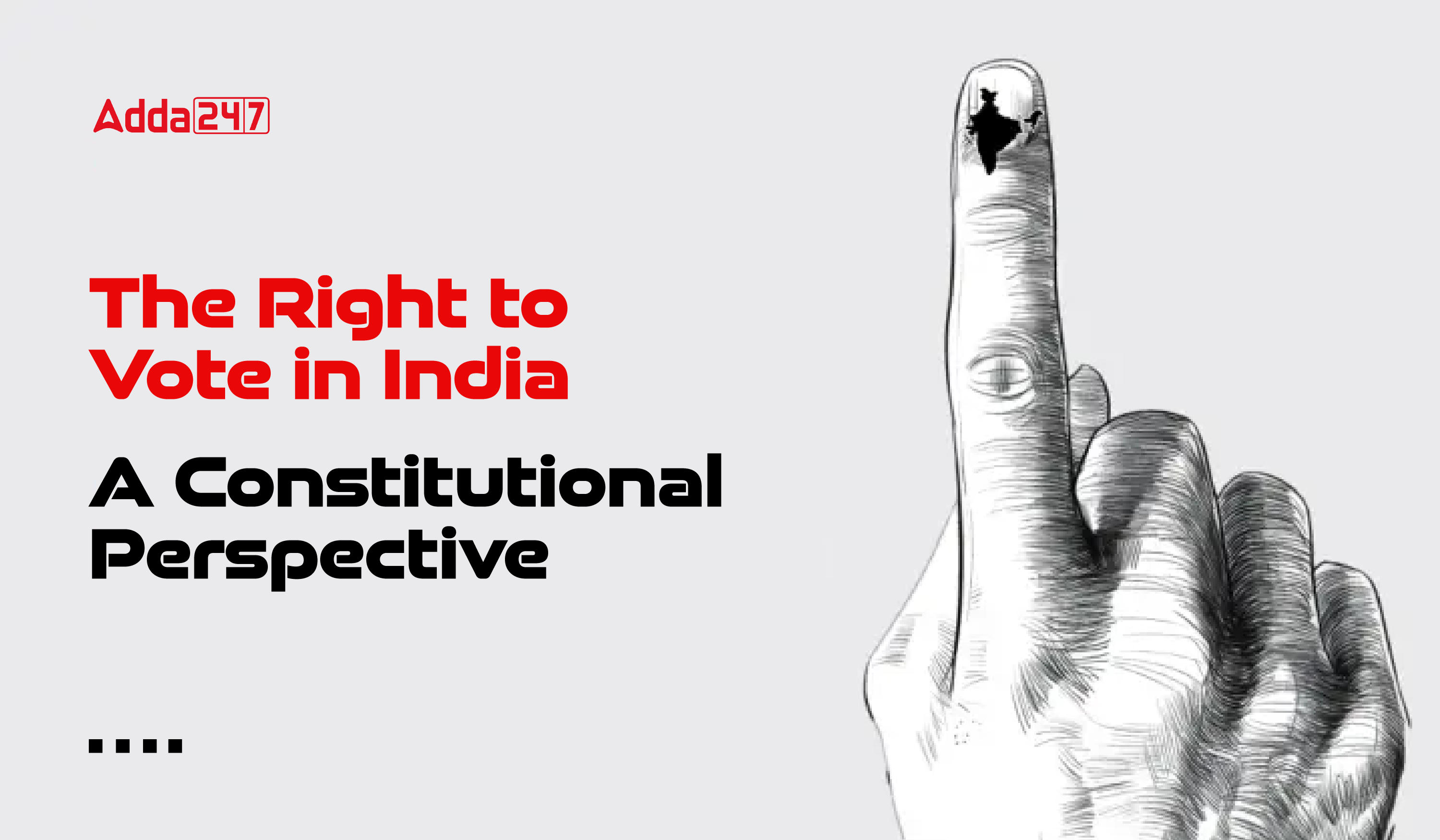Table of Contents
Right to vote is fundamental to the functioning of any democracy, acting as the primary mechanism through which citizens participate in the governance process. In India, this right is particularly significant given the country’s vast and diverse population. Ensuring that every eligible citizen can vote is a cornerstone of India’s democratic ethos, reflecting the Nation’s commitment to equality and justice.
Right to Vote: Meaning
Voting rights refer to the entitlements granted to citizens to participate in the election of their government representatives. In a democracy, these rights are essential as they empower citizens to influence government policies and leadership. Voting rights encompass not only the ability to cast a ballot but also the assurance that each vote is counted equally, thereby promoting political equality and fair representation.
Right to Vote: Historical Context
India’s journey from a British colony to an independent democracy has been marked by a gradual expansion of voting rights. Under British rule, voting was restricted to a select few, with acts like the Indian Councils Act of 1861 and 1892 offering limited electoral participation. The Morley-Minto Reforms of 1909 introduced separate electorates for Muslims but still restricted the electorate. The Government of India Act of 1919 introduced a diarchy system and direct elections for a small percentage of the male population. The 1935 Act expanded voting rights but remained limited to a minority.
Independence in 1947 marked a turning point, granting universal adult franchise to every adult citizen irrespective of caste, creed, race, gender, or ethnicity. This historic move was first exercised in the 1951-52 general elections, with over 173 million registered voters, making it the largest democratic exercise in the world. The 61st Constitution Amendment Act of 1988 further lowered the voting age from 21 to 18, empowering the youth.
Right to Vote: Constitutional Provisions
Articles 324-329 in Part XV of the Indian Constitution provide a robust framework for free and fair elections:
- Article 324: Establishes the Election Commission of India (ECI) to oversee elections to Parliament, State Legislatures, and the offices of President and Vice-President.
- Article 325: Prohibits exclusion from electoral rolls based on religion, race, caste, or sex.
- Article 326: Mandates elections to the Lok Sabha and State Assemblies based on universal adult suffrage.
- Articles 327 and 328: Allow Parliament and State Legislatures to legislate on electoral matters.
- Article 329: Bars judicial interference in electoral matters.
The ECI, an autonomous Constitutional authority established on January 25, 1950, administers elections to ensure their integrity and fairness.
Voting Process in India
- Eligibility and Registration
Every Indian citizen aged 18 and above is entitled to vote unless disqualified due to non-residence, unsound mind, crime, or corrupt practices. Eligible voters must register in their constituency, providing proof of age, residence, and identity. - Polling Day Procedure
On polling day, voters’ names are checked against the electoral roll. Indelible ink is applied to their finger, and they proceed to cast their vote via Electronic Voting Machines (EVMs). The Voter Verifiable Paper Audit Trail (VVPAT) system ensures transparency by providing a paper record of the vote.
Significance of Voting in a Democracy
Voting is the cornerstone of democracy, enabling citizens to choose their representatives and hold them accountable. It ensures political equality, as each vote has equal weight regardless of the voter’s background. High voter turnout strengthens democratic legitimacy and fosters a sense of civic duty.
Right to Vote: Challenges and Overcoming Barriers
Despite progress, voter turnout remains a challenge, influenced by political apathy, logistical issues, and socio-economic barriers. Voter education and awareness campaigns, such as the Election Commission’s Systematic Voters Education and Electoral Participation (SVEEP) program, aim to address these issues. Enhancing accessibility for people with disabilities, ensuring security at polling stations, and encouraging women’s participation are crucial steps.
Right to Vote: Constitutional or Statutory Right?
The debate on whether the right to vote is a constitutional or statutory right has seen various interpretations. While Article 326 of the Constitution provides for adult suffrage, the Representation of the People Act, 1951 governs electoral processes. Key legal cases have shaped the understanding of voting rights:
- NP Ponnuswami Case: Classified voting as a statutory right.
- Jyoti Basu Case: Emphasized that election-related rights are governed by statutes.
- People’s Union for Civil Liberties (PUCL) Case: Suggested a Constitutional basis for voting rights, though opinions were divided.
Recent Supreme Court observations, including those by CJI DY Chandrachud, suggest that the right to vote is indeed a Constitutional right, integral to the democratic process.
Conclusion
Voting is not merely a legal obligation but a civic duty crucial for sustaining democracy. As the world’s largest democracy, India’s success hinges on active citizen participation in elections. By exercising the right to vote, citizens contribute to nation-building and ensure that democracy thrives in both principle and practice.



 TSPSC Group 1 Question Paper 2024, Downl...
TSPSC Group 1 Question Paper 2024, Downl...
 TSPSC Group 1 Answer key 2024 Out, Downl...
TSPSC Group 1 Answer key 2024 Out, Downl...
 UPSC Prelims 2024 Question Paper, Downlo...
UPSC Prelims 2024 Question Paper, Downlo...




